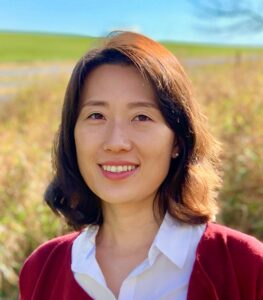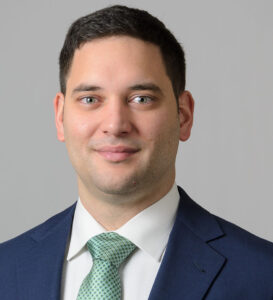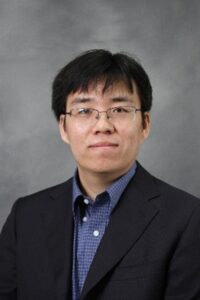Three ME faculty will join us for a panel discussion about successfully navigating graduate school and applying this knowledge to your career or start-up. Come and learn about their graduate experiences and ask questions.
 Prof. SeungYeon Kang joined the Department of Mechanical Engineering in 2021 as an Assistant Professor. She earned her B.S. in Chemical Engineering from Cornell University and Ph.D. in Applied Physics from Harvard University. Prior to joining as a faculty, she was a postdoctoral research associate at Princeton University in the Mechanical and Aerospace Engineering and then served as the UCONN site program manager for NSF’s SHAP3D additive manufacturing center. She also has industry experience working at Samsung SDI Battery Materials R&D Center as a Senior Research Engineer. Her diverse research experience led to establishment of a highly interdisciplinary research lab that focuses on advanced laser processing techniques and energy storage technology.
Prof. SeungYeon Kang joined the Department of Mechanical Engineering in 2021 as an Assistant Professor. She earned her B.S. in Chemical Engineering from Cornell University and Ph.D. in Applied Physics from Harvard University. Prior to joining as a faculty, she was a postdoctoral research associate at Princeton University in the Mechanical and Aerospace Engineering and then served as the UCONN site program manager for NSF’s SHAP3D additive manufacturing center. She also has industry experience working at Samsung SDI Battery Materials R&D Center as a Senior Research Engineer. Her diverse research experience led to establishment of a highly interdisciplinary research lab that focuses on advanced laser processing techniques and energy storage technology.
 Prof. Georgios Matheou an Assistant Professor in the Department of Mechanical Engineering at the University of Connecticut. Before joining UConn, he was a research scientist at Jet Propulsion Laboratory and a Visiting Associate in Aerospace at the California Institute of Technology. He received his Diploma in Mechanical Engineering (2002) from the National Technical University of Athens and a Ph.D. in Aeronautics from Caltech (2008). Dr. Matheou’s research interests include fluid dynamics and turbulence, modeling of multi-scale multi-physics flows, numerical methods, and high-performance computing. Dr. Matheou received the American Physical Society’s Milton Van Dyke (2011) and Galley of Fluid Motion Awards (2016 and 2021), NASA’s Early Career Public Achievement Medal, the University Teaching Innovation Award, and the NSF CAREER Award.
Prof. Georgios Matheou an Assistant Professor in the Department of Mechanical Engineering at the University of Connecticut. Before joining UConn, he was a research scientist at Jet Propulsion Laboratory and a Visiting Associate in Aerospace at the California Institute of Technology. He received his Diploma in Mechanical Engineering (2002) from the National Technical University of Athens and a Ph.D. in Aeronautics from Caltech (2008). Dr. Matheou’s research interests include fluid dynamics and turbulence, modeling of multi-scale multi-physics flows, numerical methods, and high-performance computing. Dr. Matheou received the American Physical Society’s Milton Van Dyke (2011) and Galley of Fluid Motion Awards (2016 and 2021), NASA’s Early Career Public Achievement Medal, the University Teaching Innovation Award, and the NSF CAREER Award.
Prof. Georges Pavlidis joined the Department of Mechanical Engineering at the University of Connecticut as an Assistant Professor in 2022. Prior to that, he was an NRC Postdoctoral Researcher in the Nanoscale Spectroscopy Group at NIST. He earned his M.Eng in Mechanical Engineering from Imperial College London in 2013 and his Ph.D. degree in Mechanical Engineering from the Georgia Institute of Technology in 2018. Dr. Pavlidis specializes in the thermal characterization of WBG semiconductors for RF and power electronics. He has developed electrical/optical methods, with high spatial and temporal resolution, to assess the performance and reliability of III-nitrides devices. His recent publications investigate improving hBN polariton lifetimes and developing high throughput techniques for interfacial thermal conductance mapping.

